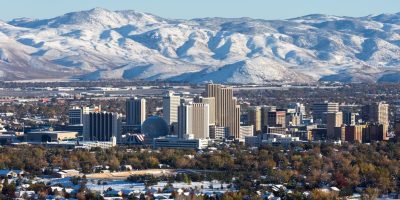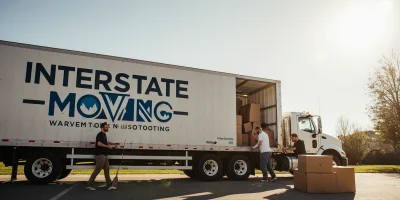Home > Interstate Moving > Moving to Nevada: Your Guide to the Silver State
Moving to Nevada: Your Guide to the Silver State
Relocating to Nevada has become an increasingly popular choice for those seeking a blend of urban excitement, outdoor adventure, and financial benefits. Whether you’re drawn to the vibrant nightlife of Las Vegas, the natural beauty surrounding Lake Tahoe, or the business-friendly environment, moving to Nevada offers a unique lifestyle that appeals to a wide range of people. But before you pack your bags, it’s essential to understand the nuances of living in the Silver State, from the cost of living and popular destinations to the pros and cons of making Nevada your new home.

Our Moving Services for Nevada
- Long Distance Moving: Moving to Nevada from out of state requires careful planning and execution. Our long-distance moving services handle all aspects of your relocation, ensuring your belongings are packed, transported, and delivered safely to your new home.
- Commercial and Office Relocation: If you’re relocating your business to Nevada, our commercial moving services minimize downtime and ensure a seamless transition. We handle everything from packing and transporting office equipment to setting up your new workspace.
- Residential and Apartment Moves: Whether you’re moving to a sprawling home in the suburbs or a chic apartment in Las Vegas, our residential moving services are designed to cater to your specific needs. We offer professional packing, loading, and unloading services to make your move as smooth as possible.
- Last Minute Moving Services: Sometimes life throws unexpected challenges your way, and you need to move quickly. Our last-minute moving services are here to help you relocate to Nevada efficiently, even on short notice.
- Flat Fee Moving Services: Budgeting for a move can be challenging, but our flat fee moving services provide transparent pricing with no hidden fees. You’ll know exactly what to expect, allowing you to plan your move to Nevada with confidence.
- Furniture Moving: Whether you’re moving an entire household or just a few key pieces, our furniture moving services ensure that your items are handled with care and arrive in perfect condition. We specialize in transporting delicate and valuable items, ensuring they make it to your new Nevada home safely.
Why people are moving to Nevada
Nevada has become a top destination for new residents, attracting people with its favorable tax environment, affordable cost of living, and vibrant culture. But why are people moving to Nevada, and what makes it such an appealing place to live? Here are some of the key reasons:
Tax Benefits: One of the most significant draws of living in Nevada is the lack of state income tax. This financial benefit is particularly attractive to retirees, business owners, and anyone looking to maximize their income. Compared to California, where taxes are among the highest in the nation, Nevada offers a much more favorable tax environment.
Affordable Cost of Living: While housing prices in Nevada have risen in recent years, the cost of living remains lower than in many neighboring states, particularly California. Residents of Nevada enjoy affordable housing, lower utility costs, and generally lower expenses for goods and services.
Economic Opportunities: Nevada’s economy is diverse and growing, with strong sectors in tourism, entertainment, technology, and renewable energy. Las Vegas, in particular, is a hub for hospitality and gaming, while cities like Reno are attracting tech companies and startups. The state’s business-friendly policies make it an attractive destination for entrepreneurs and established businesses alike.
Outdoor Recreation: Nevada is a paradise for outdoor enthusiasts. From the stunning landscapes of the Sierra Nevada mountains to the vast expanses of the Mojave Desert, the state offers endless opportunities for hiking, skiing, boating, and more. Lake Tahoe, one of the most beautiful alpine lakes in the world, straddles the Nevada-California border and provides year-round recreation.
Vibrant Lifestyle: Nevada offers a vibrant lifestyle that combines the excitement of urban living with the tranquility of nature. Las Vegas, known as the entertainment capital of the world, offers world-class dining, shows, and nightlife, while quieter areas like Henderson and Reno provide a more relaxed pace of life.

Pros and Cons of Living in Nevada
- No State Income Tax: One of the biggest financial benefits of living in Nevada is the lack of state income tax, allowing residents to keep more of their earnings.
- Affordable Housing: Compared to neighboring California, housing in Nevada is more affordable, with lower property taxes and overall cost of living.
- Diverse Economic Opportunities: With thriving industries in tourism, gaming, technology, and renewable energy, Nevada offers a wide range of job opportunities.
- Outdoor Recreation: Nevada’s diverse landscapes provide endless opportunities for outdoor activities, from skiing in the Sierra Nevada to exploring the Red Rock Canyon.
- Mild Winters: While summers can be hot, particularly in southern Nevada, winters are generally mild, especially in cities like Las Vegas, making it a comfortable place to live year-round.
- Extreme Heat: Summers in Nevada, particularly in southern regions like Las Vegas, can be extremely hot, with temperatures often exceeding 100°F. This can be challenging for those not accustomed to desert climates.
- Limited Public Transportation: While cities like Las Vegas and Reno have public transportation systems, they are not as extensive as those in larger metropolitan areas, making a car essential for most residents.
- Gambling and Tourism: While tourism is a significant part of Nevada’s economy, the prevalence of gambling and casinos can be a downside for some, particularly those looking for a quieter, family-friendly environment.
- Water Shortages: Nevada, being a desert state, faces ongoing challenges related to water scarcity. Residents need to be mindful of water usage, and there are concerns about long-term sustainability as the population grows.
- Education System: Nevada’s public education system has faced criticism for underperformance, particularly in comparison to other states. However, there are efforts underway to improve educational outcomes and provide more resources to students.
Cost of Living in Nevada
Housing Costs: Housing is one of the most significant expenses in Nevada, but it remains more affordable than in many neighboring states. In cities like Las Vegas and Reno, home prices have been rising, but they are still lower than in major California cities. Renting is also a more affordable option, with a wide range of properties available at different price points.
Utilities: Nevada’s desert climate means that utility costs, particularly for air conditioning, can be high during the summer months. However, the state’s mild winters help offset some of these costs. Overall, utilities in Nevada are comparable to the national average.
Transportation: Nevada’s gas prices are generally around the national average, and while public transportation is available in larger cities, most residents rely on personal vehicles. Car insurance rates in Nevada are also relatively high, particularly in urban areas.
Groceries and Dining: The cost of groceries and dining out in Nevada is similar to the national average, though it can be slightly higher in tourist-heavy areas like Las Vegas. The state’s diverse food scene offers everything from affordable local eateries to high-end dining experiences.
Popular Destinations

Moving to Nevada costs
Moving to Nevada involves several costs, particularly if you’re relocating from out of state. Here’s what you can expect:
Moving Company Costs: The cost of hiring a moving company in Nevada can vary depending on the distance of your move, the volume of your belongings, and the services you require. On average, local moves within the state can range from $500 to $2,000, while long-distance moves can cost upwards of $3,000 or more.
Packing Supplies: Don’t forget to budget for packing supplies, such as boxes, tape, and bubble wrap. These costs can add up, especially if you have a lot of fragile items.
Travel Expenses: Depending on where you’re moving from, you may need to budget for travel expenses, including gas, flights, or accommodations during your journey.
Temporary Housing: If your new home isn’t ready by the time you arrive, you may need to arrange for temporary housing, which can be an additional expense.
















